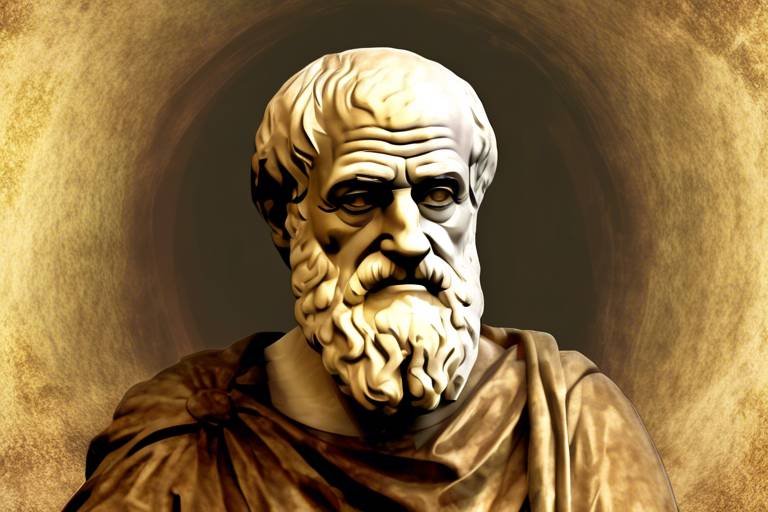Exploring Thomas Aquinas' Doctrine of Virtue
Welcome to a fascinating journey into the heart of moral philosophy, where we will explore the profound insights of Thomas Aquinas regarding virtue. Why is virtue so crucial in our lives? Well, Aquinas believed that virtue is not just a set of moral guidelines; it is the very essence of what it means to live a good life. In his view, virtue is a habit of the mind that leads us to make the right choices, fostering both personal development and the well-being of society. This article will delve into Aquinas' doctrine, illuminating its significance and the transformative power it holds for ethical behavior and character development.
Imagine virtue as a compass, guiding us through the murky waters of ethical dilemmas. Aquinas categorized virtues into two main types: cardinal virtues, which are the fundamental virtues that support moral behavior, and theological virtues, which connect us to the divine. This dual framework not only provides us with a roadmap for personal conduct but also emphasizes the importance of community and relationships in our moral journey. So, buckle up as we navigate through Aquinas' insightful teachings on virtue, and discover how they can enrich our lives today!
Understanding the essence of virtue is crucial in Aquinas' philosophy. For him, virtue is defined as a habitual and firm disposition to do good. It’s not just about occasional good deeds; it’s about developing a character that consistently seeks the good in all situations. This leads us to ask ourselves: What does it mean to be virtuous? In Aquinas' view, virtue is intrinsically linked to our purpose as human beings. It enables us to achieve moral excellence and fulfill our potential as rational creatures.
Aquinas believed that virtues are not innate; rather, they are cultivated through practice and conscious effort. Just like a musician perfects their craft through hours of practice, we too must engage in virtuous acts repeatedly to develop a virtuous character. This process of habituation is essential for moral growth and helps us navigate life's challenges with grace and integrity.
Aquinas identifies four cardinal virtues: prudence, justice, fortitude, and temperance. Each of these virtues plays a pivotal role in ethical decision-making and personal development. Let's take a closer look at each of these virtues and understand their significance.
Prudence is often regarded as the mother of all virtues. It is the virtue that allows us to make wise decisions by applying reason to our actions. Prudence involves not only knowing what is right but also understanding how to act on that knowledge. Imagine you're at a crossroads, and you have to choose between two paths. Prudence is the ability to weigh the options carefully, considering the consequences of each choice before making a decision. In everyday life, this could manifest in various ways, such as choosing to save money rather than spend it impulsively or deciding to help a friend in need rather than ignoring their plight.
Justice is a fundamental virtue in Aquinas' ethics. It embodies the idea of giving each individual their due and ensuring fairness in our interactions. Think of justice as the glue that holds society together, fostering trust and cooperation among individuals. When we practice justice, we advocate for the rights of others, promote equality, and strive for a balanced society where everyone has the opportunity to thrive. In a world where injustice often prevails, the virtue of justice serves as a beacon of hope and a call to action for all of us.
Fortitude, or courage, is essential for facing challenges head-on. It empowers individuals to confront adversity and remain steadfast in their moral commitments. Picture a soldier bravely standing on the battlefield, unwavering in the face of danger—that’s fortitude in action. In our daily lives, fortitude might look like standing up for what we believe in, even when it’s unpopular, or persevering through tough times when giving up seems easier. This virtue encourages resilience and strength, reminding us that we can overcome obstacles with determination and courage.
Temperance involves self-control and moderation. It’s about finding balance in our desires and avoiding excess in various aspects of life. Imagine a tightrope walker skillfully navigating the thin line between indulgence and restraint; that’s the essence of temperance. By practicing temperance, we learn to enjoy life’s pleasures without becoming enslaved by them. Whether it’s in our eating habits, spending, or even our emotions, temperance helps us maintain harmony and well-being in our lives.
In addition to cardinal virtues, Aquinas emphasizes three theological virtues: faith, hope, and charity. These virtues are unique as they connect us to the divine and enrich our moral lives. Let’s explore their significance.
Faith serves as a foundation for understanding and belief in God. It’s not just about blind belief; it’s about trust and a relationship with the divine that influences our moral behavior. Faith shapes our values and guides our actions, urging us to live in alignment with our beliefs. When we have faith, we are more likely to act with integrity and compassion towards others.
Hope provides the motivation to strive for eternal life. It’s the spark that ignites our desire for a better future and encourages us to pursue a virtuous life. Hope fosters resilience, reminding us that even in the darkest times, there is light at the end of the tunnel. It encourages us to keep moving forward, believing that our efforts towards virtue will ultimately lead to fulfillment.
Charity, or love, is the highest virtue in Aquinas' doctrine. It transcends all other virtues, embodying the essence of selflessness and compassion. Charity transforms our relationships, fostering a sense of community and belonging. It compels us to look beyond ourselves and serve others, creating a ripple effect of kindness and generosity in the world. When we practice charity, we not only uplift others but also enrich our own lives in the process.
Aquinas argues that virtue is developed through habit. This means that the more we engage in virtuous actions, the more they become a part of our character. Just like building muscle through exercise, cultivating virtues requires consistent effort and practice. By repeatedly choosing to act with prudence, justice, fortitude, and temperance, we gradually shape our character and moral compass.
Virtue plays a critical role in the flourishing of society. When individuals embody virtue, they contribute to the common good, creating a positive impact on their communities. A society filled with virtuous people is one where trust, cooperation, and compassion thrive. By embracing Aquinas' doctrine of virtue, we not only enhance our own lives but also inspire those around us to pursue a path of moral excellence.
- What are the main virtues according to Aquinas?
Aquinas identifies four cardinal virtues: prudence, justice, fortitude, and temperance, along with three theological virtues: faith, hope, and charity.
- How can I develop virtues in my life?
Developing virtues requires practice and conscious effort. Engage in virtuous actions consistently, reflect on your choices, and seek to improve your character over time.
- Why are virtues important in society?
Virtues promote trust, cooperation, and compassion, leading to a flourishing society where individuals can thrive and contribute to the common good.

The Nature of Virtue
Understanding the essence of virtue is crucial in Aquinas' philosophy, as it serves as the cornerstone for moral excellence and ethical behavior. But what exactly is virtue? At its core, virtue can be seen as a habitual and firm disposition to do good. It's not merely about performing good actions occasionally; rather, it's about cultivating a character that consistently seeks the good in every situation. Think of virtue as a muscle: the more you exercise it, the stronger it becomes, enabling you to tackle life's moral dilemmas with confidence and grace.
Aquinas believed that virtues are not innate; they are developed through practice and habituation. This means that every time we choose to act virtuously, we reinforce our ability to do so in the future. It's like learning to ride a bike—initially, it may seem daunting, but with each attempt, you gain balance and confidence until it becomes second nature. In this sense, virtue is a journey rather than a destination, requiring ongoing commitment and effort.
Moreover, Aquinas distinguished between different types of virtue, categorizing them into cardinal and theological virtues. Cardinal virtues, such as prudence, justice, fortitude, and temperance, are foundational to ethical behavior and serve as the guiding principles for our actions. On the other hand, theological virtues—faith, hope, and charity—connect us to the divine and elevate our moral pursuits beyond mere human standards. Together, these virtues create a comprehensive framework for understanding and achieving moral excellence.
To better illustrate the nature of virtue, consider the following table that outlines the key characteristics of both cardinal and theological virtues:
| Type of Virtue | Examples | Characteristics |
|---|---|---|
| Cardinal Virtues | Prudence, Justice, Fortitude, Temperance | Practical wisdom, fairness, courage, self-control |
| Theological Virtues | Faith, Hope, Charity | Belief in God, aspiration for eternal life, unconditional love |
In summary, the nature of virtue is multifaceted, encompassing both the habitual practice of good actions and a deeper connection to our moral and spiritual lives. It challenges us to grow, to strive for excellence, and to contribute positively to the world around us. By embracing virtue, we not only enhance our own lives but also inspire others to pursue their ethical journeys, creating a ripple effect of goodness in society.

The Cardinal Virtues
In the rich tapestry of Thomas Aquinas' moral philosophy, the cardinal virtues stand out as essential pillars that support ethical living. These virtues—prudence, justice, fortitude, and temperance—are not just lofty ideals; they are practical traits that guide individuals in their daily decisions and interactions. Think of them as the four compass points that help navigate the complex landscape of morality. Each virtue contributes uniquely to the fabric of character, shaping how we respond to life's challenges and opportunities.
Let’s dive deeper into each of these cardinal virtues, exploring their characteristics and significance in ethical decision-making. By understanding these virtues, we can better appreciate how they influence our actions and interactions with others, leading to a more virtuous and fulfilling life.
Often hailed as the mother of all virtues, prudence is the ability to judge correctly and act accordingly. It’s like having a moral GPS that helps you navigate through the fog of uncertainty. Prudence involves not just knowing the right thing to do, but also having the wisdom to apply that knowledge in real situations. Imagine you’re faced with a tough decision—prudence is what allows you to weigh the pros and cons, consider the consequences, and choose a path that aligns with your moral values.
Justice is a cornerstone of Aquinas' ethical framework, emphasizing fairness and the importance of giving each individual their due. Think of justice as the scale that balances rights and responsibilities. It’s about treating others with respect and ensuring that everyone receives what they deserve, whether it's praise, punishment, or simply recognition. In a world where inequality often reigns, practicing justice can lead to a more equitable society where everyone thrives.
Fortitude, or courage, is the virtue that empowers us to face challenges head-on. It’s the inner strength that allows us to stand firm in our convictions, even when the going gets tough. Picture a soldier standing bravely on the battlefield, unwavering in the face of adversity. That’s fortitude in action! This virtue is essential for maintaining moral commitments and pursuing what is right, despite the obstacles that may arise. It reminds us that courage isn’t the absence of fear, but rather the determination to act rightly in spite of it.
Temperance is all about moderation and self-control. It’s the virtue that helps us find balance in life, preventing us from falling into the trap of excess. Think of it as the wise friend who gently reminds you to slow down and enjoy life without overindulging. Whether it’s in our appetites, desires, or even ambitions, temperance encourages us to practice restraint, leading to a more harmonious existence. It teaches us that true happiness often lies in moderation rather than in extremes.
In summary, the cardinal virtues are not just abstract concepts; they are practical tools that help us navigate the complexities of life. By cultivating prudence, justice, fortitude, and temperance, we can develop a robust moral character that not only benefits ourselves but also positively impacts those around us. In the next sections, we will explore the theological virtues and their significance in Aquinas' ethical framework, further enriching our understanding of virtue and moral living.
- What are the cardinal virtues according to Thomas Aquinas?
The cardinal virtues are prudence, justice, fortitude, and temperance, which serve as foundational traits for ethical behavior. - How do the cardinal virtues influence decision-making?
Each virtue provides a framework for evaluating choices, ensuring that decisions align with moral values and promote fairness and balance. - Can virtues be developed over time?
Yes, virtues can be cultivated through practice and habit, leading to the formation of a virtuous character.

Prudence is often regarded as the mother of all virtues, and for good reason. It's the guiding light that helps us navigate the often murky waters of moral decision-making. Imagine you're at a crossroads, each path leading to a different outcome. Prudence is the inner compass that helps you assess the situation, weigh your options, and choose the best course of action. It’s not just about knowing what is right; it’s about understanding how to apply that knowledge in real-life scenarios.
At its core, prudence involves a blend of wisdom and foresight. It encourages us to think critically about our choices and their potential consequences. For instance, when faced with a difficult decision at work, a prudent person would consider not only the immediate effects of their choice but also how it might impact their colleagues and the organization in the long run. This is where prudence shines: it helps us to avoid rash decisions that could lead to regret.
Moreover, prudence is not merely a solitary virtue; it interacts with others, enhancing our overall moral character. It works hand-in-hand with virtues like justice and temperance, creating a well-rounded approach to ethical living. For example, consider a situation where someone is tempted to indulge in excess. Prudence would remind them to practice moderation, aligning their actions with the virtue of temperance.
To illustrate the significance of prudence, let’s consider a simple analogy. Think of a gardener tending to a garden. Without the prudent application of water, sunlight, and care, the plants may wither or become overgrown. Similarly, in our lives, prudence helps us cultivate the right conditions for our virtues to flourish. It encourages us to reflect, plan, and execute our actions wisely, ensuring that we reap the benefits of a virtuous life.
In practical terms, prudence can be broken down into a few key components:
- Reflection: Taking the time to think about the implications of our choices.
- Assessment: Evaluating the context and potential outcomes before acting.
- Decision-Making: Making informed choices based on our reflections and assessments.
Ultimately, prudence is about striking a balance. It’s about knowing when to act and when to pause. It’s what keeps us grounded and focused on our moral compass, guiding us toward a life of ethical integrity. In a world filled with distractions and temptations, cultivating prudence can be the difference between a life of chaos and a life of meaningful direction.

mother
This article delves into the foundational aspects of Thomas Aquinas' doctrine of virtue, examining its significance in moral philosophy and its implications for ethical behavior and character development.
Understanding the essence of virtue is crucial in Aquinas' philosophy. This section will explore how virtue is defined and its role in achieving moral excellence.
Aquinas identifies four cardinal virtues: prudence, justice, fortitude, and temperance. This section will discuss each virtue's characteristics and importance in ethical decision-making.
Prudence is often regarded as the of all virtues. This virtue is not just a guiding principle; it acts as the compass for moral reasoning and decision-making in everyday life. Imagine being on a road trip without a map or GPS—how lost would you feel? Prudence helps us navigate the complexities of life by allowing us to evaluate our choices carefully and consider the consequences of our actions. It’s the ability to judge correctly in all situations, which is essential for making sound decisions that align with our moral values. In a world filled with distractions and temptations, prudence stands as a beacon, guiding us to act wisely and thoughtfully.
Justice is a fundamental virtue in Aquinas' ethics. Here, we will explore its implications for fairness, equity, and the importance of giving each individual their due.
Fortitude, or courage, is essential for facing challenges. This section will discuss how fortitude empowers individuals to confront adversity and remain steadfast in their moral commitments.
Temperance involves self-control and moderation. This subheading will delve into how temperance contributes to a balanced life and the avoidance of excess in various aspects.
In addition to cardinal virtues, Aquinas emphasizes three theological virtues: faith, hope, and charity. This section will explore their significance in the context of divine grace and moral living.
Faith serves as a foundation for understanding and belief in God. This subheading will discuss how faith influences moral behavior and shapes one's relationship with the divine.
Hope provides the motivation to strive for eternal life. This section will examine how hope fosters resilience and encourages individuals to pursue a virtuous life.
Charity, or love, is the highest virtue in Aquinas' doctrine. This subheading will explore its transformative power in personal relationships and community building.
Aquinas argues that virtue is developed through habit. This section will discuss how repeated actions contribute to the formation of virtuous character and moral behavior.
Virtue plays a critical role in the flourishing of society. This section will explore how individuals embodying virtue can positively impact their communities and promote the common good.
- What are the cardinal virtues according to Aquinas?
Aquinas identifies prudence, justice, fortitude, and temperance as the four cardinal virtues essential for ethical decision-making. - How does prudence influence moral behavior?
Prudence acts as a guiding force, helping individuals make wise decisions by considering the consequences of their actions. - What is the significance of the theological virtues?
The theological virtues—faith, hope, and charity—are essential for understanding divine grace and living a moral life.

of all virtues. This subheading will examine how prudence guides moral reasoning and decision-making in everyday life.
Understanding the essence of virtue is crucial in Aquinas' philosophy. This section will explore how virtue is defined and its role in achieving moral excellence.
Aquinas identifies four cardinal virtues: prudence, justice, fortitude, and temperance. This section will discuss each virtue's characteristics and importance in ethical decision-making.
Often regarded as the mother of all virtues, prudence holds a special place in Thomas Aquinas' ethical framework. It is not merely about being cautious; rather, it embodies the ability to make sound judgments and decisions based on a thorough understanding of the situation at hand. Prudence acts as a guiding light, illuminating the path of moral reasoning and helping individuals navigate the complexities of daily life. When faced with choices, whether trivial or monumental, prudence encourages us to weigh our options carefully, considering both the short-term and long-term consequences of our actions.
Imagine you're at a crossroads, with various paths leading to different outcomes. Prudence is the compass that helps you determine which direction aligns with your values and goals. It prompts you to ask essential questions: What are the potential consequences of my decision? How does this choice reflect my character and principles? By engaging in this reflective process, prudence not only aids in making wise choices but also fosters a deeper understanding of oneself and one's moral obligations.
In everyday life, prudence manifests in various ways. For instance, when deciding whether to engage in risky behavior or to invest time in a worthwhile project, a prudent person will evaluate the potential risks and rewards. This thoughtful consideration enables individuals to act in ways that promote their well-being and that of others. Furthermore, prudence is not a solitary virtue; it interacts with others, such as justice and temperance, to create a well-rounded moral character.
To illustrate the significance of prudence, consider the following table that highlights its key characteristics:
| Characteristic | Description |
|---|---|
| Judgment | Ability to assess situations and make informed decisions. |
| Reflection | Encourages thoughtful consideration of actions and their consequences. |
| Balance | Helps in finding the right measure in actions, avoiding extremes. |
| Practicality | Focuses on realistic and achievable outcomes in decision-making. |
Ultimately, prudence is about cultivating a mindset that prioritizes wisdom over impulse. It teaches us that the road to virtue is not paved with rash decisions but rather with careful deliberation and a commitment to ethical living. In a world where instant gratification often overshadows thoughtful consideration, the virtue of prudence stands as a beacon, guiding us toward a more meaningful and responsible existence.
In addition to cardinal virtues, Aquinas emphasizes three theological virtues: faith, hope, and charity. This section will explore their significance in the context of divine grace and moral living.
Faith serves as a foundation for understanding and belief in God. This subheading will discuss how faith influences moral behavior and shapes one's relationship with the divine.
Hope provides the motivation to strive for eternal life. This section will examine how hope fosters resilience and encourages individuals to pursue a virtuous life.
Charity, or love, is the highest virtue in Aquinas' doctrine. This subheading will explore its transformative power in personal relationships and community building.
Aquinas argues that virtue is developed through habit. This section will discuss how repeated actions contribute to the formation of virtuous character and moral behavior.
Virtue plays a critical role in the flourishing of society. This section will explore how individuals embodying virtue can positively impact their communities and promote the common good.
- What is the significance of prudence in moral decision-making?
Prudence is crucial as it guides individuals in making informed and ethical choices by considering the consequences of their actions. - How do the cardinal virtues interact with each other?
The cardinal virtues support and enhance one another, creating a comprehensive framework for ethical behavior. - Can virtues be developed over time?
Yes, virtues can be cultivated through practice and habit, leading to a more virtuous character.

Justice
Justice is not just a concept; it’s a vital thread woven into the fabric of Aquinas' ethical framework. For Aquinas, justice transcends mere legalistic interpretations; it embodies a profound commitment to fairness and equity in human interactions. Imagine a world where everyone receives what they are due—this is the essence of justice. It’s about creating a balance where individuals respect each other's rights and fulfill their obligations, ensuring that the scales of morality remain perfectly aligned.
Aquinas breaks down justice into two primary categories: commutative justice and distributive justice. Commutative justice relates to the fairness in exchanges between individuals, ensuring that transactions are equitable and that no one is taken advantage of. Think of it like a fair trade; if you give someone a product or service, you should receive an equivalent value in return. On the other hand, distributive justice pertains to how resources and benefits are allocated within a community. It’s about the fair distribution of wealth, opportunities, and privileges, ensuring that everyone has access to what they need to thrive.
To further illustrate this, consider the following table that outlines the key differences between commutative and distributive justice:
| Type of Justice | Description | Example |
|---|---|---|
| Commutative Justice | Fairness in exchanges between individuals | Buying a car for a fair price |
| Distributive Justice | Fair allocation of resources within a community | Government distributing funds for public services |
Justice is crucial for maintaining social cohesion and trust. When people believe they are treated justly, they are more likely to cooperate and contribute positively to society. However, when injustice prevails, it breeds resentment and conflict, leading to societal breakdown. Aquinas understood that a just society is one where individuals are not only aware of their rights but also their responsibilities towards others. It’s a delicate balance, much like a tightrope walker maintaining equilibrium while performing their act.
Furthermore, justice is deeply intertwined with the concept of the common good. Aquinas posits that true justice seeks not only the benefit of the individual but also the welfare of the community as a whole. This means that a just society is one where policies and practices are directed towards uplifting everyone, especially the most vulnerable. In this light, justice can be seen as a moral compass guiding us toward actions that foster harmony and promote well-being among all members of society.
In summary, justice in Aquinas' philosophy is not merely a legal principle but a moral imperative that calls for fairness, equity, and the pursuit of the common good. It challenges us to reflect on our actions and consider how they affect others, urging us to create a world where everyone is treated with dignity and respect. So, the next time you think about justice, remember that it’s about more than just laws; it’s about building a community where everyone can thrive together.
- What is the difference between commutative and distributive justice?
Commutative justice deals with fairness in exchanges between individuals, while distributive justice focuses on the fair allocation of resources within a community. - Why is justice important in society?
Justice is essential for maintaining social cohesion, trust, and cooperation among individuals, ensuring that everyone is treated fairly and equitably. - How does Aquinas' concept of justice relate to the common good?
Aquinas emphasizes that true justice seeks not only individual benefit but also the welfare of the community, guiding actions towards the upliftment of all.

Fortitude
Fortitude, often synonymous with courage, is a virtue that embodies the strength to confront challenges head-on. In the grand tapestry of human experience, fortitude serves as a beacon, guiding individuals through the storms of life. Imagine standing at the edge of a cliff, the winds howling around you, and the ground below seemingly treacherous. It is in these moments that fortitude shines, urging us to take that leap of faith, to face our fears, and to remain steadfast in our moral commitments.
Aquinas believed that fortitude is not merely about physical bravery; it is deeply rooted in the moral courage to act rightly, even in the face of adversity. This virtue empowers us to overcome obstacles and makes it possible to pursue what is truly good. For instance, consider a person who stands up for justice in the face of societal pressure. It takes immense fortitude to voice dissent against injustice, especially when it could lead to personal loss or isolation. Yet, it is this very strength that defines their character and contributes to the greater good.
Fortitude is characterized by several key attributes:
- Resilience: The ability to bounce back from setbacks and challenges.
- Perseverance: The determination to keep moving forward despite difficulties.
- Steadfastness: Remaining firm in one’s convictions, even when faced with opposition.
Moreover, fortitude is not a solitary virtue; it often works in tandem with others, such as prudence and justice. For example, a prudent individual will assess the situation carefully before acting, while a just person will ensure that their actions are fair and equitable. Together, these virtues create a robust framework for ethical decision-making, enabling individuals to navigate complex moral landscapes with confidence and integrity.
In practical terms, cultivating fortitude involves embracing discomfort and uncertainty. It requires us to step outside our comfort zones and confront the fears that hold us back. Think of fortitude as a muscle; the more we exercise it, the stronger it becomes. By facing our fears, whether they are personal challenges, societal injustices, or moral dilemmas, we not only build our own character but also inspire others to do the same.
In conclusion, fortitude is a vital virtue that equips individuals to confront life’s challenges with courage and resolve. It is the inner strength that allows us to pursue our moral obligations, even when the path is fraught with difficulties. As we strive to embody this virtue in our daily lives, we not only enhance our character but also contribute positively to our communities, fostering a culture of resilience and integrity.
- What is the difference between fortitude and courage? Fortitude encompasses a broader range of moral strength, including the courage to act rightly in difficult situations, while courage often refers specifically to the ability to confront physical dangers.
- How can one develop fortitude? Fortitude can be developed through practice, facing fears, and making conscious decisions to act in accordance with one’s values, even when it is challenging.
- Is fortitude a personal or social virtue? Fortitude is both personal and social; it helps individuals face personal challenges while also empowering them to stand up for justice and the common good in society.

Temperance
Temperance, often described as the virtue of moderation, is a powerful concept in the philosophy of Thomas Aquinas. It acts as a guiding principle that helps individuals navigate the complexities of life by promoting self-control and balance. Imagine a tightrope walker, skillfully maintaining their equilibrium as they traverse a high wire. This is akin to how temperance operates in our lives—it encourages us to find a harmonious balance between excess and deficiency. Without temperance, one might easily tip over into the chaotic realms of overindulgence or, conversely, extreme deprivation.
Aquinas believed that temperance is essential for achieving a well-rounded and fulfilling life. It is not merely about abstaining from pleasures but rather about enjoying them in a way that is healthy and constructive. For instance, consider the enjoyment of food. While indulging in a sumptuous feast can be delightful, doing so excessively may lead to negative health consequences. Temperance teaches us to appreciate food without allowing it to dominate our lives. In this sense, temperance is about making wise choices that enhance our overall well-being rather than detract from it.
The role of temperance extends beyond personal choices; it also influences our interactions with others. When we practice temperance, we cultivate patience and understanding, allowing us to engage in more meaningful relationships. For example, in a heated discussion, a temperate individual knows when to listen and when to speak, fostering a respectful exchange of ideas rather than a confrontational debate. This ability to moderate our responses is crucial in maintaining healthy relationships and community dynamics.
To further illustrate the significance of temperance, let’s consider its four key components:
- Self-Control: The ability to resist temptations and impulses that lead to excess.
- Moderation: Finding the right balance in all aspects of life, from eating to spending.
- Discipline: Establishing routines that promote healthy habits and discourage harmful behaviors.
- Mindfulness: Being aware of our choices and their impacts on ourselves and others.
In conclusion, temperance is not just a passive state of being; it's an active practice that requires constant effort and reflection. It invites us to engage with our desires thoughtfully and to approach life's pleasures with a sense of balance. As we strive for temperance, we not only enhance our own lives but also contribute positively to the world around us. In the grand tapestry of Aquinas' virtues, temperance stands as a vital thread that weaves together the fabric of moral living, guiding us toward a life marked by harmony and fulfillment.

The Theological Virtues
In the rich tapestry of Thomas Aquinas' moral philosophy, the theological virtues hold a special place, distinct from the cardinal virtues. These virtues—faith, hope, and charity—are directly related to God and serve as the foundation for a life aimed at divine communion. While cardinal virtues guide our moral actions in a worldly context, the theological virtues elevate our moral compass towards the divine, establishing a profound connection between humanity and God.
Faith is often considered the cornerstone of the theological virtues. It is not merely an intellectual assent to doctrines but a deep-seated trust in God and His promises. Faith shapes our moral behavior by providing a lens through which we interpret our experiences and decisions. When faced with moral dilemmas, a faithful person is more likely to seek divine guidance, ensuring that their choices align with a higher moral standard. In essence, faith acts as a guiding star, illuminating the path of righteousness even in the darkest of times.
Next, we have hope, which serves as our motivational force. Hope propels us towards the ultimate goal of eternal life, encouraging us to persevere through life's challenges. It instills a sense of optimism and resilience, reminding us that our efforts in pursuing virtue are not in vain. Hope is like a bridge that connects our present struggles with the promise of future fulfillment. It encourages individuals to cultivate a virtuous life, as they believe in the possibility of achieving their highest potential through divine grace.
Finally, charity, or love, is regarded as the highest theological virtue. It transcends all others and is the very essence of Aquinas’ moral philosophy. Charity is not just a feeling; it is an active expression of love towards God and our neighbors. This virtue transforms relationships, fostering a spirit of community and compassion. When individuals embody charity, they contribute to the common good, creating a ripple effect that enhances societal well-being. Charity teaches us that true fulfillment comes not from self-interest but from selfless love and service to others.
In summary, the theological virtues of faith, hope, and charity are essential to Aquinas' vision of a virtuous life. They not only guide individuals in their moral journey but also foster a deeper relationship with the divine. By embracing these virtues, we can cultivate a life characterized by moral excellence and profound connection to both God and our fellow human beings.
- What are the theological virtues? The theological virtues are faith, hope, and charity, which guide individuals in their relationship with God.
- How do theological virtues differ from cardinal virtues? The theological virtues focus on our relationship with God, while cardinal virtues relate to moral actions in everyday life.
- Why is charity considered the highest virtue? Charity is seen as the highest virtue because it embodies selfless love and is foundational for building community and fostering compassion.

Faith
Faith, in the context of Thomas Aquinas' doctrine, is not merely a passive acceptance of beliefs; it is a dynamic force that shapes our moral compass and guides our actions. It serves as the bedrock upon which our understanding of God and the universe is built. When we talk about faith, we often think of it as a blind leap into the unknown, but Aquinas argues that it is much more than that. It's an informed trust, a conviction that emerges from reason and experience, enabling us to navigate the complexities of life with purpose and direction.
One of the most fascinating aspects of faith is its ability to influence moral behavior. Imagine faith as a lighthouse guiding a ship through stormy seas; without it, we may find ourselves lost in a world filled with moral ambiguity. Faith illuminates our path, helping us discern right from wrong, and instills in us a sense of responsibility towards others. It encourages us to act in ways that reflect our beliefs, fostering a deeper connection with the divine and with our fellow human beings.
Aquinas also emphasizes that faith is not a solitary endeavor; it thrives in community. When individuals come together, sharing their beliefs and experiences, they create a tapestry of faith that enriches everyone involved. This communal aspect of faith helps to strengthen our moral resolve, as we draw inspiration from one another. Here are some key points about how faith operates within a community:
- Shared Values: Faith encourages a common understanding of ethics and morality, promoting a unified approach to challenges.
- Support System: In times of doubt or hardship, a community of faith provides emotional and spiritual support, helping individuals remain steadfast in their beliefs.
- Collective Growth: As individuals share their journeys, the community grows in wisdom and understanding, fostering a deeper collective faith.
Moreover, faith is not static; it evolves as we encounter new experiences and challenges. Just as a tree grows stronger with each passing season, our faith deepens through trials and tribulations. Aquinas believed that our struggles often serve as catalysts for growth, pushing us to reevaluate our beliefs and strengthen our commitment to them. This dynamic nature of faith is crucial for personal development and moral living.
In conclusion, faith is an integral part of Aquinas' doctrine of virtue. It is the lens through which we view our actions and the world around us. By embracing faith, we not only enhance our moral understanding but also cultivate a richer, more meaningful relationship with the divine and our community. As we strive to embody the virtues Aquinas outlines, let us remember that faith is the driving force that propels us towards a virtuous life, illuminating our path and inspiring us to act with love and compassion.
- What is the relationship between faith and virtue in Aquinas' philosophy?
Faith acts as a foundation for virtue, guiding moral behavior and influencing our decisions. - How does faith impact community life?
Faith fosters shared values, provides support, and encourages collective growth among individuals. - Can faith evolve over time?
Yes, faith is dynamic and can deepen through personal experiences and challenges.

Hope
Hope is often described as a beacon in the fog of life's uncertainties. It serves as a powerful motivator, urging individuals to strive towards a better future, even when the present seems bleak. In the context of Thomas Aquinas' doctrine of virtue, hope is not merely a passive wish but an active pursuit of the ultimate good—eternal life with God. This virtue transforms our outlook, instilling a sense of purpose and direction in our lives.
When we talk about hope, we're diving into a realm where possibilities abound. It's like having a compass in a vast ocean; it guides us through storms and uncertainties, reminding us that there is something greater to strive for. Aquinas believed that hope is deeply intertwined with faith and charity, forming a triad of virtues that elevate human existence. Together, they create a framework for moral living that transcends mere survival, pushing us toward a life filled with meaning and connection.
One of the most compelling aspects of hope is its ability to foster resilience. When faced with challenges, hope encourages us to keep moving forward. It whispers to us that setbacks are temporary and that perseverance can lead to eventual triumph. For instance, consider a student struggling with a particularly tough subject. Hope fuels their determination to study harder, seek help, and ultimately succeed. This cycle of hope and action is not just beneficial on an individual level; it resonates throughout communities, inspiring collective efforts to overcome adversity.
Moreover, Aquinas posits that hope is essential for spiritual growth. It nurtures our relationship with the divine, reminding us that we are part of a larger narrative. Through hope, we are encouraged to trust in God's plan, even when we cannot see the path ahead. This relationship is reciprocal—our hope strengthens our faith, and in turn, our faith deepens our hope. It's a beautiful dance of virtues that enriches our lives and those around us.
To illustrate the significance of hope in our lives, we can look at its impact on various aspects of human experience:
- Emotional Well-being: Hope contributes to a positive outlook, reducing feelings of anxiety and despair.
- Motivation: It encourages individuals to set and pursue goals, fostering personal and professional growth.
- Community Spirit: Hope can unite people, leading to collaborative efforts for social change and support.
In conclusion, hope is not just a fleeting emotion; it is a vital virtue that empowers us to navigate life’s challenges with courage and optimism. By embracing hope, we align ourselves with a higher purpose, making our journey through life not only bearable but also meaningful. As we cultivate hope within ourselves, we also inspire those around us to do the same, creating a ripple effect that can uplift entire communities.
- What is the role of hope in Aquinas' philosophy?
Hope is a theological virtue that motivates individuals to pursue the ultimate good, enhancing their moral and spiritual lives. - How can hope influence our daily decisions?
Hope instills a sense of purpose, encouraging us to make choices that align with our values and aspirations. - Can hope exist without faith?
While hope is interconnected with faith, it can still exist independently as a desire for a positive outcome, though it may lack the depth provided by faith.

Charity
, often referred to as love, stands as the pinnacle of Thomas Aquinas' doctrine of virtue. It's not merely a feeling or an emotion; it is an active, conscious decision to seek the good of others. In Aquinas' view, charity transcends all other virtues, embodying the essence of moral living. It is through charity that individuals can truly connect with one another and foster a sense of community, which is vital for a harmonious society. Imagine charity as the glue that binds people together, creating strong relationships and fostering mutual support.
At the heart of charity lies the concept of selflessness. When we act out of charity, we prioritize the needs of others over our own desires. This self-giving nature is what makes charity so transformative. It compels us to look beyond ourselves, to recognize the inherent dignity of every individual, and to act in ways that uplift and empower those around us. In a world where it's easy to get caught up in our own struggles, charity serves as a reminder to extend our hands and hearts to others.
Furthermore, charity is not limited to grand gestures; it can manifest in the smallest of actions. Whether it's offering a listening ear, volunteering time to help those in need, or simply showing kindness to a stranger, these acts of charity contribute to a greater sense of community. Aquinas believed that charity is a virtue that grows through practice; the more we engage in charitable acts, the more it becomes a part of our character.
To understand the significance of charity in Aquinas' philosophy, we can consider its three primary dimensions:
- Love for God: Charity begins with a profound love for God, which inspires individuals to act in accordance with divine will.
- Love for Self: Recognizing one's own worth and dignity is crucial; self-love enables individuals to appreciate their value in the eyes of God.
- Love for Others: This is the most visible expression of charity, where individuals actively seek to promote the well-being of others.
In essence, charity is the driving force behind ethical behavior; it shapes our moral compass and guides our actions. It encourages us to look beyond our immediate needs and consider the broader impact of our choices. In a society that often prioritizes individualism, charity reminds us of our interconnectedness and the responsibility we have towards one another.
As we strive to embody charity in our daily lives, we contribute to a culture of compassion and understanding. This, in turn, creates a ripple effect, inspiring others to act with love and kindness. Ultimately, charity is not just a virtue; it is a way of life that enriches our souls and transforms our communities.
- What is the difference between charity and other virtues? Charity is considered the greatest virtue as it encompasses love for God, self, and others, while other virtues focus on specific moral qualities.
- How can I practice charity in my daily life? You can practice charity by engaging in acts of kindness, volunteering, or simply being there for someone in need.
- Is charity only about giving money? No, charity can take many forms, including time, support, and love towards others, not just financial contributions.

The Role of Habit in Virtue
When we talk about virtue, it’s essential to recognize that it doesn’t just spring up out of nowhere. Instead, it’s often cultivated through habit. Imagine trying to build a muscle; you wouldn’t just lift weights once and expect to see results, right? Similarly, virtues are like muscles that require regular exercise to develop and strengthen. Thomas Aquinas emphasized that virtues are not merely inherent qualities but are instead formed through consistent practice and repeated actions.
In Aquinas' view, habit plays a crucial role in shaping our character. When individuals perform virtuous actions repeatedly, those actions become second nature, leading to a virtuous character. This transformation occurs because the brain begins to recognize these actions as part of our identity. The more we engage in virtuous behavior, the more we align our desires and actions with moral principles. It’s akin to learning to ride a bike; at first, it feels awkward and challenging, but with practice, it becomes effortless and instinctive.
To illustrate this concept, let's consider the four cardinal virtues Aquinas identified: prudence, justice, fortitude, and temperance. Each of these virtues can be developed through habitual practice:
| Virtue | Habitual Action | Outcome |
|---|---|---|
| Prudence | Reflecting before making decisions | Improved decision-making skills |
| Justice | Practicing fairness in daily interactions | Stronger relationships and community trust |
| Fortitude | Facing fears and challenges head-on | Increased resilience and courage |
| Temperance | Exercising self-control in indulgences | A more balanced and fulfilling life |
As we can see from the table, each virtue has specific actions associated with it that, when practiced regularly, lead to profound outcomes in our lives. This habitual practice is not just about doing good deeds; it’s about internalizing those actions so that they become part of who we are. Over time, these repeated actions shape our character, making us more virtuous individuals.
Moreover, the role of habit in virtue extends beyond individual development. When communities encourage virtuous habits, they foster an environment where ethical behavior flourishes. Think about it: if everyone in a community practices justice and temperance, the entire society benefits from increased trust and harmony. It’s like a ripple effect; one person’s virtuous habit can inspire others, creating a culture of virtue that enhances the common good.
In conclusion, Aquinas’ doctrine reminds us that virtue is not a static trait but a dynamic quality that we can develop through habitual practice. By consciously choosing to engage in virtuous actions, we can transform our character and contribute positively to our communities. So, the next time you find yourself faced with a moral decision, remember that each choice is an opportunity to strengthen your character and embody the virtues that lead to a flourishing life.
- What are the cardinal virtues according to Aquinas? The cardinal virtues are prudence, justice, fortitude, and temperance.
- How do habits influence our moral character? Habits shape our character by reinforcing virtuous actions until they become second nature.
- Can virtues be taught or learned? Yes, virtues can be developed through practice and consistent engagement in virtuous behaviors.
- Why is community important in developing virtue? A supportive community can encourage and reinforce virtuous habits, creating a positive environment for moral growth.

The Importance of Virtue in Society
Virtue is not just a personal trait; it is a cornerstone of a thriving society. When individuals embody virtuous qualities, they contribute to a collective moral fabric that enhances the community's overall well-being. Imagine a society where everyone practices justice, prudence, fortitude, and temperance. It would be a place where fairness prevails, decisions are made with careful consideration, challenges are faced with courage, and excess is avoided. This ideal scenario is not merely a dream; it can be a reality if we prioritize virtue in our daily lives.
One of the most significant impacts of virtue in society is its ability to foster trust among individuals. When people act with integrity and fairness, it builds a sense of community and mutual respect. Trust is the glue that holds relationships together, whether in personal interactions or broader social structures. For example, in a workplace where employees uphold virtues, collaboration flourishes, and productivity soars. The same principle applies to neighborhoods, schools, and even nations.
Moreover, virtuous individuals often take on leadership roles, guiding others toward moral excellence. They serve as role models, demonstrating the importance of ethical behavior and inspiring those around them to strive for similar ideals. This ripple effect can lead to a culture of virtue where ethical conduct becomes the norm rather than the exception. When we think about historical figures who have made a significant impact, such as Martin Luther King Jr. or Mahatma Gandhi, we see how their commitment to virtue not only transformed their own lives but also ignited change in society.
In addition, the presence of virtue in society promotes the common good. When individuals prioritize the welfare of others, it leads to actions that benefit the community as a whole. This can manifest in various ways, such as volunteering, participating in community service, or advocating for social justice. For instance, a community that values charity will likely see initiatives aimed at helping the less fortunate, thereby reducing inequality and fostering a sense of belonging.
However, the importance of virtue does not stop at individual actions; it also extends to institutions. Organizations that prioritize ethical practices create environments where employees feel valued and respected. This, in turn, leads to higher morale and lower turnover rates. In contrast, a lack of virtue within institutions can lead to corruption, mistrust, and ultimately, societal decay. Therefore, it is essential for both individuals and organizations to commit to virtuous behavior.
In conclusion, the importance of virtue in society cannot be overstated. It is fundamental to building trust, fostering leadership, promoting the common good, and ensuring the integrity of institutions. By cultivating virtue within ourselves and encouraging it in others, we pave the way for a brighter, more harmonious future. As we reflect on our roles in society, let us ask ourselves: How can we embody virtue in our daily lives? The answer lies in our actions, our choices, and our unwavering commitment to ethical living.
- What are the benefits of living a virtuous life? Living a virtuous life enhances personal satisfaction, builds strong relationships, and contributes positively to society.
- How can individuals cultivate virtue? Individuals can cultivate virtue through self-reflection, practicing good habits, and surrounding themselves with like-minded people.
- Why is virtue important in leadership? Virtue is crucial in leadership as it fosters trust, inspires others, and guides ethical decision-making.
- Can virtue be taught? Yes, virtue can be taught through education, mentorship, and positive role modeling.
Frequently Asked Questions
- What is the essence of virtue according to Thomas Aquinas?
According to Aquinas, virtue is a habitual and firm disposition to do good. It empowers individuals to act according to reason, leading to moral excellence and the fulfillment of one's purpose. Virtue isn't just about knowing what is right; it's about consistently choosing to do what is right.
- Can you explain the four cardinal virtues?
Absolutely! The four cardinal virtues identified by Aquinas are:
- Prudence: This is the ability to judge correctly and choose wisely. It’s like having a moral compass that guides your decisions.
- Justice: Justice is about giving each individual their due. It’s the foundation of fairness and equity in society.
- Fortitude: Also known as courage, fortitude enables individuals to face challenges and remain steadfast in their commitments, even in the face of adversity.
- Temperance: This virtue involves self-control and moderation, helping individuals to avoid excess and maintain a balanced life.
- What are the theological virtues?
Aquinas highlights three theological virtues: faith, hope, and charity. Faith is about belief in God, hope inspires us to strive for eternal life, and charity, or love, is considered the highest virtue, transforming our relationships and communities.
- How does habit relate to the development of virtue?
Aquinas argues that virtues are developed through habitual actions. The more we practice virtuous behaviors, the more they become ingrained in our character, leading to consistent moral behavior over time.
- Why is virtue important for society?
Virtue is critical for the flourishing of society because individuals embodying virtue can positively impact their communities. When people act virtuously, they promote the common good, fostering a healthier, more just, and harmonious society.



















